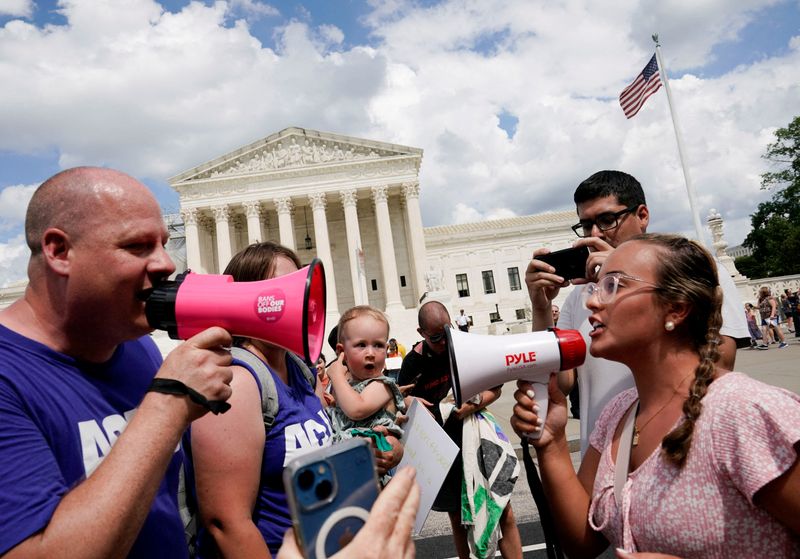By John Kruzel
WASHINGTON (Reuters) - The idea of a doctor in the United States having to consider the risk of imprisonment before performing an emergency abortion might have been difficult to imagine just two years ago.
But after the U.S. Supreme Court in June 2022 overturned the 1973 Roe v. Wade ruling that had legalized abortion nationwide, such dilemmas are a reality in several states that have since adopted Republican-backed near-total bans that include the threat of criminal penalties and loss of medical licensure.
The court on Wednesday is set to hear arguments in a case pitting Idaho's strict abortion ban against a federal law that ensures that patients can receive emergency care. It forces the court, which has a 6-3 conservative majority, to revisit the fraught legal landscape that it created with its 2022 Dobbs v. Jackson Women's Health Organization ruling that scuttled Roe.
Idaho is appealing a judge's decision, made in a 2022 lawsuit by President Joe Biden's administration, that found that the 1986 federal law at issue, the Emergency Medical Treatment and Labor Act (EMTALA), takes precedence over the state's law.
EMTALA requires hospitals that receive funding under the federal Medicare program to "stabilize" patients with emergency medical conditions. At issue now is whether Idaho's ban must yield to EMTALA when a doctor determines an abortion is the necessary "stabilizing care."
"The Supreme Court is having to reckon with, yet again, litigating abortion rights in an era that the majority opinion in Dobbs suggested would return it to the states and out of the courts," said Rachel Rebouché, dean of the law school at Temple University in Philadelphia.
"In the cross-hairs here are providers," Rebouché added, "many of whom just want to deliver care and know it's legal."
In Idaho, a so-called abortion "trigger" law automatically took effect upon Roe's reversal. Passed by the Republican-led state legislature and signed by Republican Governor Brad Little in 2020, Idaho's law bans all abortions unless needed to prevent a mother's death.
Idaho is one of seven states with no exception to protect the health of pregnant patients, according to a U.S. Justice Department filing.
Among the critics of Idaho's near-total abortion ban are some of the state's doctors, who would face two to five years in prison and suspension or revocation of their medical license if convicted of performing what the law calls a "criminal abortion."
"Criminalization of doctors providing healthcare is dangerous for patients, for doctors and for our communities," Amelia Huntsberger, an obstetrician-gynecologist who practiced medicine in Idaho for a decade before relocating to Oregon due to Idaho's abortion law, wrote this month in an open letter to Idaho's legislature.
The number of obstetricians in Idaho dropped from 268 to 210 in the first 15 months after its abortion ban took effect, according to the Idaho Physician Well-Being Action Collaborative, a group founded by doctors in the state.
National groups representing obstetricians, gynecologists and emergency physicians have told the Supreme Court that many emergency conditions that could threaten the woman's life and health - from gestational hypertension to excessive bleeding - could require an abortion to stabilize her or avoid seizures, vital organ damage and failure, or the loss of the uterus.
But Idaho's law allows for abortion only to prevent the woman's death, which makes it impossible to comply with both EMTALA and Idaho law, the providers said.
Clinicians are expected to make high-stakes judgments under the threat of criminal penalty, they added.
"At what point," they asked in their filing, "does the condition of a pregnant woman with a uterine hemorrhage deteriorate from health-threatening to the point that an abortion is 'necessary' to prevent death? When is it certain she will die but for medical intervention? How many blood units does she have to lose?"
WHEN TWO LAWS COLLIDE
Following Roe's demise, Biden's administration issued federal guidance stating that EMTALA takes precedence over state abortion bans when the two conflict.
Idaho's Republican attorney general and top Republican state lawmakers in court papers told the Supreme Court that the state's law and EMTALA are not actually at odds.
"Whatever emergency medical treatment EMTALA could require is consistent with the balance struck in Idaho law," the state officials wrote.
Boise-based U.S. District Judge B. Lynn Winmill in 2022 blocked enforcement of Idaho's law in cases of abortions that are needed to avoid putting the woman's health in "serious jeopardy" or risking "serious impairment to bodily functions."
"Where federal law requires the provision of care and state law criminalizes that very care, it is impossible to comply with both laws," the judge wrote.
The Supreme Court in January let Idaho enforce its law while also agreeing to decide its legality. A ruling is expected by the end of June.
